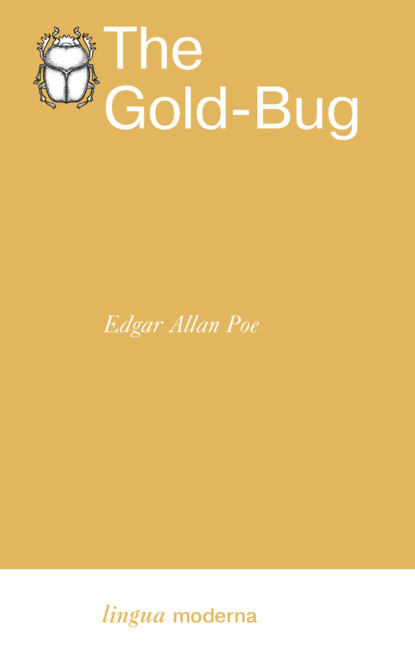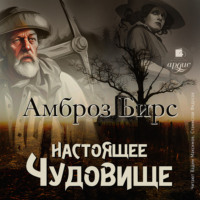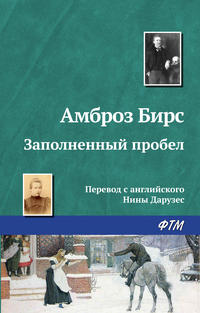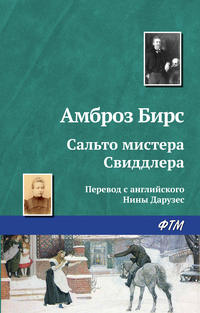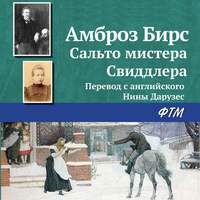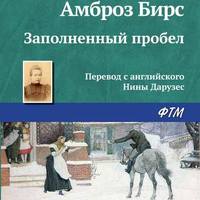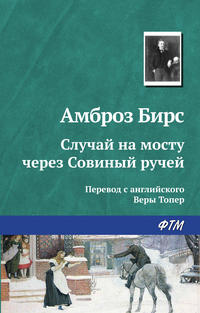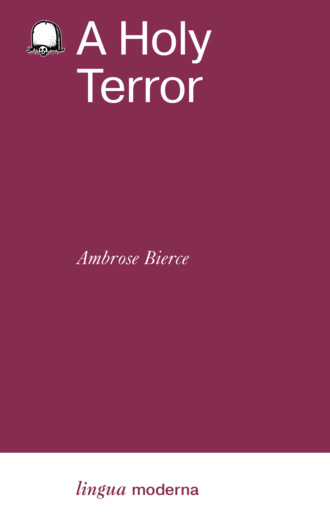
Полная версия
A Holy Terror / Настоящее чудовище
V
Some months later a party of men and women belonging to the highest social circles of San Francisco passed through Hurdy-Gurdy on their way to the Yosemite Valley by a new trail. They halted for dinner and during its preparation explored the desolate camp. One of the party had been at Hurdy-Gurdy in the days of its glory. He had, indeed, been one of its prominent citizens; and it used to be said that more money passed over his faro table in any one night than over those of all his competitors in a week; but being now a millionaire engaged in greater enterprises, he did not deem these early successes of sufficient importance to merit the distinction of remark. His invalid wife, a lady famous in San Francisco for the costly nature of her entertainments and her exacting rigor with regard to the social position and “antecedents” of those who attended them, accompanied the expedition. During a stroll among the shanties of the abandoned camp Mr. Porfer directed the attention of his wife and friends to a dead tree on a low hill beyond Injun Creek.
“As I told you,” he said, “I passed through this camp in 1852, and was told that no fewer than five men had been hanged here by vigilantes at different times, and all on that tree. If I am not mistaken, a rope is dangling from it yet. Let us go over and see the place.”
Mr. Porfer did not add that the rope in question was perhaps the very one from whose fatal embrace his own neck had once had an escape so narrow that an hour's delay in taking himself out of that region would have spanned it.
Proceeding leisurely down the creek to a convenient crossing, the party came upon the cleanly picked skeleton of an animal which Mr. Porfer after due examination pronounced to be that of an ass. The distinguishing ears were gone, but much of the inedible head had been spared by the beasts and birds, and the stout bridle of horsehair was intact, as was the riata, of similar material, connecting it with a picket pin still firmly sunken in the earth. The wooden and metallic elements of a miner's kit lay near by. The customary remarks were made, cynical on the part of the men, sentimental and refined by the lady. A little later they stood by the tree in the cemetery and Mr. Porfer sufficiently unbent from his dignity to place himself beneath the rotten rope and confidently lay a coil of it about his neck, somewhat, it appeared, to his own satisfaction, but greatly to the horror of his wife, to whose sensibilities the performance gave a smart shock.
An exclamation from one of the party gathered them all about an open grave, at the bottom of which they saw a confused mass of human bones and the broken remnants of a coffin. Coyotes and buzzards had performed the last sad rites for pretty much all else. Two skulls were visible and in order to investigate this somewhat unusual redundancy one of the younger men had the hardihood to spring into the grave and hand them up to another before Mrs. Porfer could indicate her marked disapproval of so shocking an act, which, nevertheless, she did with considerable feeling and in very choice words. Pursuing his search among the dismal debris at the bottom of the grave the young man next handed up a rusted coffin plate, with a rudely cut inscription, which with difficulty Mr. Porfer deciphered and read aloud with an earnest and not altogether unsuccessful attempt at the dramatic effect which he deemed befitting to the occasion and his rhetorical abilities:
MANUELITA MURPHY. Born at the Mission San Pedro – Died in Hurdy-Gurdy, Aged 47. Hell's full of such.
In deference to the piety of the reader and the nerves of Mrs. Porfer's fastidious sisterhood of both sexes let us not touch upon the painful impression produced by this uncommon inscription, further than to say that the elocutionary powers of Mr. Porfer had never before met with so spontaneous and overwhelming recognition.
The next morsel that rewarded the ghoul in the grave was a long tangle of black hair defiled with clay: but this was such an anti-climax that it received little attention. Suddenly, with a short exclamation and a gesture of excitement, the young man unearthed a fragment of grayish rock, and after a hurried inspection handed it up to Mr. Porfer. As the sunlight fell upon it it glittered with a yellow luster – it was thickly studded with gleaming points. Mr. Porfer snatched it, bent his head over it a moment and threw it lightly away with the simple remark:
“Iron pyrites – fool's gold.”
The young man in the discovery shaft was a trifle disconcerted, apparently.
Meanwhile, Mrs. Porfer, unable longer to endure the disagreeable business, had walked back to the tree and seated herself at its root. While rearranging a tress of golden hair which had slipped from its confinement she was attracted by what appeared to be and really was the fragment of an old coat. Looking about to assure herself that so unladylike an act was not observed, she thrust her jeweled hand into the exposed breast pocket and drew out a mouldy pocket-book. Its contents were as follows:
One bundle of letters, postmarked “ Elizabethtown, New Jersey.”
One circle of blonde hair tied with a ribbon.
One photograph of a beautiful girl.
One ditto of same, singularly disfigured.
One name on back of photograph – “Jefferson Doman.”
A few moments later a group of anxious gentlemen surrounded Mrs. Porfer as she sat motionless at the foot of the tree, her head dropped forward, her fingers clutching a crushed photograph. Her husband raised her head, exposing a face ghastly white, except the long, deforming cicatrice, familiar to all her friends, which no art could ever hide, and which now traversed the pallor of her countenance like a visible curse.
Mary Matthews Porfer had the bad luck to be dead.
An Occurrence at Owlcreek Bridge
I
Aman stood upon a railroad bridge in northern Alabama, looking down into the swift water twenty feet below. The man's hands were behind his back, the wrists bound with a cord. A rope closely encircled his neck. It was attached to a stout cross-timber above his head and the slack fell to the level of his knees. Some loose boards laid upon the ties supporting the rails of the railway supplied a footing for him and his executioners – two private soldiers of the Federal army, directed by a sergeant who in civil life may have been a deputy sheriff. At a short remove upon the same temporary platform was an officer in the uniform of his rank, armed. He was a captain. A sentinel at each end of the bridge stood with his rifle in the position known as “support,” that is to say, vertical in front of the left shoulder, the hammer resting on the forearm thrown straight across the chest – a formal and unnatural position, enforcing an erect carriage of the body. It did not appear to be the duty of these two men to know what was occurring at the center of the bridge; they merely blockaded the two ends of the foot planking that traversed it.
Beyond one of the sentinels nobody was in sight; the railroad ran straight away into a forest for a hundred yards, then, curving, was lost to view. Doubtless there was an outpost farther along. The other bank of the stream was open ground – a gentle slope topped with a stockade of vertical tree trunks, loopholed for rifles, with a single embrasure through which protruded the muzzle of a brass cannon commanding the bridge. Midway up the slope between the bridge and fort were the spectators – a single company of infantry in line, at “parade rest,” the butts of their rifles on the ground, the barrels inclining slightly backward against the right shoulder, the hands crossed upon the stock. A lieutenant stood at the right of the line, the point of his sword upon the ground, his left hand resting upon his right. Excepting the group of four at the center of the bridge, not a man moved. The company faced the bridge, staring stonily, motionless. The sentinels, facing the banks of the stream, might have been statues to adorn the bridge. The captain stood with folded arms, silent, observing the work of his subordinates, but making no sign. Death is a dignitary who when he comes announced is to be received with formal manifestations of respect, even by those most familiar with him. In the code of military etiquette silence and fixity are forms of deference.
The man who was engaged in being hanged was apparently about thirty-five years of age. He was a civilian, if one might judge from his habit, which was that of a planter. His features were good – a straight nose, firm mouth, broad forehead, from which his long, dark hair was combed straight back, falling behind his ears to the collar of his well fitting frock coat. He wore a moustache and pointed beard, but no whiskers; his eyes were large and dark gray, and had a kindly expression which one would hardly have expected in one whose neck was in the hemp. Evidently this was no vulgar assassin. The liberal military code makes provision for hanging many kinds of persons, and gentlemen are not excluded.
The preparations being complete, the two private soldiers stepped aside and each drew away the plank upon which he had been standing. The sergeant turned to the captain, saluted and placed himself immediately behind that officer, who in turn moved apart one pace. These movements left the condemned man and the sergeant standing on the two ends of the same plank, which spanned three of the cross-ties of the bridge. The end upon which the civilian stood almost, but not quite, reached a fourth. This plank had been held in place by the weight of the captain; it was now held by that of the sergeant. At a signal from the former the latter would step aside, the plank would tilt and the condemned man go down between two ties. The arrangement commended itself to his judgement as simple and effective. His face had not been covered nor his eyes bandaged. He looked a moment at his “unsteadfast footing,” then let his gaze wander to the swirling water of the stream racing madly beneath his feet. A piece of dancing driftwood caught his attention and his eyes followed it down the current. How slowly it appeared to move! What a sluggish stream!
He closed his eyes in order to fix his last thoughts upon his wife and children. The water, touched to gold by the early sun, the brooding mists under the banks at some distance down the stream, the fort, the soldiers, the piece of drift – all had distracted him. And now he became conscious of a new disturbance. Striking through the thought of his dear ones was sound which he could neither ignore nor understand, a sharp, distinct, metallic percussion like the stroke of a blacksmith's hammer upon the anvil; it had the same ringing quality. He wondered what it was, and whether immeasurably distant or near by- it seemed both. Its recurrence was regular, but as slow as the tolling of a death knell. He awaited each new stroke with impatience and – he knew not why – apprehension. The intervals of silence grew progressively longer; the delays became maddening. With their greater infrequency the sounds increased in strength and sharpness. They hurt his ear like the thrust of a knife; he feared he would shriek. What he heard was the ticking of his watch.
He unclosed his eyes and saw again the water below him. “If I could free my hands,” he thought, “I might throw off the noose and spring into the stream. By diving I could evade the bullets and, swimming vigorously, reach the bank, take to the woods and get away home. My home, thank God, is as yet outside their lines; my wife and little ones are still beyond the invader's farthest advance.”
As these thoughts, which have here to be set down in words, were flashed into the doomed man's brain rather than evolved from it the captain nodded to the sergeant. The sergeant stepped aside.
II
Peyton Farquhar was a well to do planter, of an old and highly respected Alabama family. Being a slave owner and like other slave owners a politician, he was naturally an original secessionist and ardently devoted to the Southern cause. Circumstances of an imperious nature, which it is unnecessary to relate here, had prevented him from taking service with that gallant army which had fought the disastrous campaigns ending with the fall of Corinth, and he chafed under the inglorious restraint, longing for the release of his energies, the larger life of the soldier, the opportunity for distinction. That opportunity, he felt, would come, as it comes to all in wartime. Meanwhile he did what he could. No service was too humble for him to perform in the aid of the South, no adventure too perilous for him to undertake if consistent with the character of a civilian who was at heart a soldier, and who in good faith and without too much qualification assented to at least a part of the frankly villainous dictum that all is fair in love and war.
Конец ознакомительного фрагмента.
Текст предоставлен ООО «Литрес».
Прочитайте эту книгу целиком, купив полную легальную версию на Литрес.
Безопасно оплатить книгу можно банковской картой Visa, MasterCard, Maestro, со счета мобильного телефона, с платежного терминала, в салоне МТС или Связной, через PayPal, WebMoney, Яндекс.Деньги, QIWI Кошелек, бонусными картами или другим удобным Вам способом.






